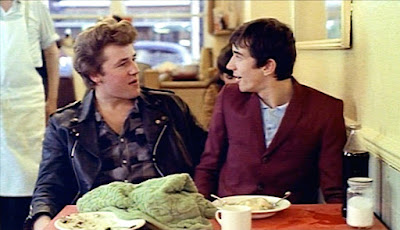I was inspired by a podcast called The 500 hosted by Los Angeles-based comedian Josh Adam Meyers. His goal, and mine, is to explore Rolling Stone Magazine's 2012 edition of The 500 Greatest Albums of All Time.
Album: #267
Album Title: Quadrophenia
Artist: The Who
Genre: Hard Rock
Recorded: Three Studios in London, U.K.
Released: October, 1973
My age at release: 8
How familiar was I with it before this week: Very
Is it on the 2020 list? No
Song I am putting on my Spotify Playlist: I'm One
.jpg) |
| Album cover for Quadrophenia from The Who. |
For a short time, in the early 80s, the local college in my hometown of London, Ontario, (Fanshawe) would hold weekend movie nights. The events became wildly popular with the city's high-school students who were always looking for inexpensive and communal entertainment. Albeit, the "communal" element was sometimes strained when intoxicated teenagers from different socio-economic sectors of the city banded together in a crowded auditorium.
.jpg) |
| Fanshawe College in London, Ontario, Canada. |
Often, the movie menus were double or even triple-headers and included screenings of risque, cult films, (The Rocky Horror Picture Show, Mad Max or Bruce Lee's Enter The Dragon). Sometimes concert films and music dramas were featured, (Pink Floyd's The Wall, Led Zeppelin's The Song Remains The Same and Quadrophenia from The Who.
The 1979 film, Quadrophenia, is loosely based on the 1973 rock opera of the same name by The Who, a British group. The movie tells the story of Jimmy, a disillusioned young man living with his working class parents while employed at a dead-end job in mid-sixties England. Jimmy's social group are "modernists" or "Mods" -- youth who dress in sharp suits and typically ride Vespa or Lambretta motor-scooters. |
Jimmy (Phil Daniels, the protagonist from
Quadrophenia on his Lambretta scooter. |
Mods would spend their evenings popping amphetamines and dancing to soul, jazz, rhythm & blues, and the latest hits from up-and-coming British bands, including The Faces and The Who. They and their rival social clique, The Rockers, were frequently at loggerheads. In contrast to their more stylish counterparts, The Rockers were greased-haired teens who sported bold pompadours. They rode powerful British motorcycles (manufactured by Triumph or BSA) and listened to 50s rock and roll, including Elvis Presley, Gene Vincent and Eddie Cochrane. |
Ray Winston as Kevin, a Rocker, who was a childhood
friend of Jimmy, now a Mod. |
Quadrophenia, the film and to a lesser extent the rock opera, is a bildungsroman story in which the protagonist, an adolescent, experiences moral, spiritual and/or psychological growth after resolving internal conflicts while overcoming external conflicts. It is a classic "coming of age" tale modelled on the "hero's journey" – often involving a young male who experiences loss, conflict, personal growth and finally change. 
Quadrophenia was recorded and released in a fraught period of industrial militancy in Britain that had not been witnessed since the general strike of 1926. The album can be ‘read’ as both a social history of an element of youth culture in the mid-1960s, but also a reflection on contemporary anxieties relating to youth, class, race, and national identity in the period 1972. Similarly, the cinematic version of Quadrophenia was conceived and directed in 1978 in the months prior to and after Margaret Thatcher was swept to power, ushering in a long period of Conservative politics that economically, socially, and culturally reshaped British society. Quadrophenia is a significant historical source for ‘reading’ these pivotal years and providing a sense of how musicians and writers were both reflecting and dramatizing a sense of ‘crisis’, ‘continuity’, and ‘change’ in working-class Britain.
 |
Jimmy's Battersea is largely untouched by
Britain's post-war affluence. Photo by Ethan Russell. |
As you might imagine, I didn't understand any of these rich, sociopolitical and historical themes and elements when I first saw this film as a teenager. Like my friends, I was titillated by the same elements that energized Jimmy -- drugs, violence, sex and popular music. I didn't even understand it as a "coming of age" story until I was in my twenties and had a few University English credits under my belt.
 |
| Promotional poster for Quadrophenia film. |
I suppose that is the thing about "coming of age". We all live our own personal bildungsroman and only learn to appreciate it after enough time has passed, thus allowing for a different perspective. At the end of the story, Jimmy walks away from the Saltdean Cliffs near Brighton as the sun sets behind him. Metaphorically, he has left his adolescence behind.  |
Jimmy walking away from the Saltdean Cliffs at the end
of this story, albeit shown at the start of the film. |
We tend not to be aware of when the sun set on our own youth until many years have passed. A specific point in time is elusive. However, we can all reflect on the time that came before – when we starred in our own personal Quadrophenial production, full of sound and fury, from roaring motorbikes, sputtering scooters or just the music that surrounded us.
.jpg)
.jpg)







Excellent, Marc. I haven't seen the film, but I was in my early 20's when this album came out and in the middle of my own process of figuring out who I really was. I identified completely with all the aspects of the "Quad" premise. I consider it Pete's finest work.
ReplyDeleteThanks so much for reading and taking the time to comment Michael. The Criterion Collection (Remastered) version of the film is fantastic. It is so much clearer from the grainy versions I saw in theatres and on VHS cassette. The sound is fantastic too. It is well worth revisiting. Some of the "racist and homophobic" slang of the time is alarming - but it stands up. I am a sucker for "Tommy" - but I do adore this record too.
ReplyDelete